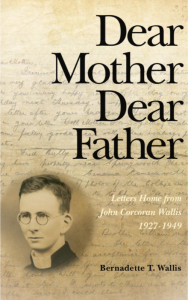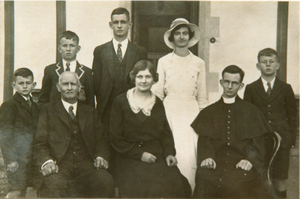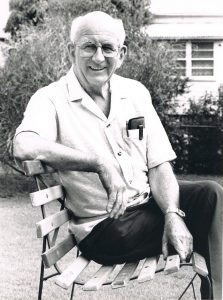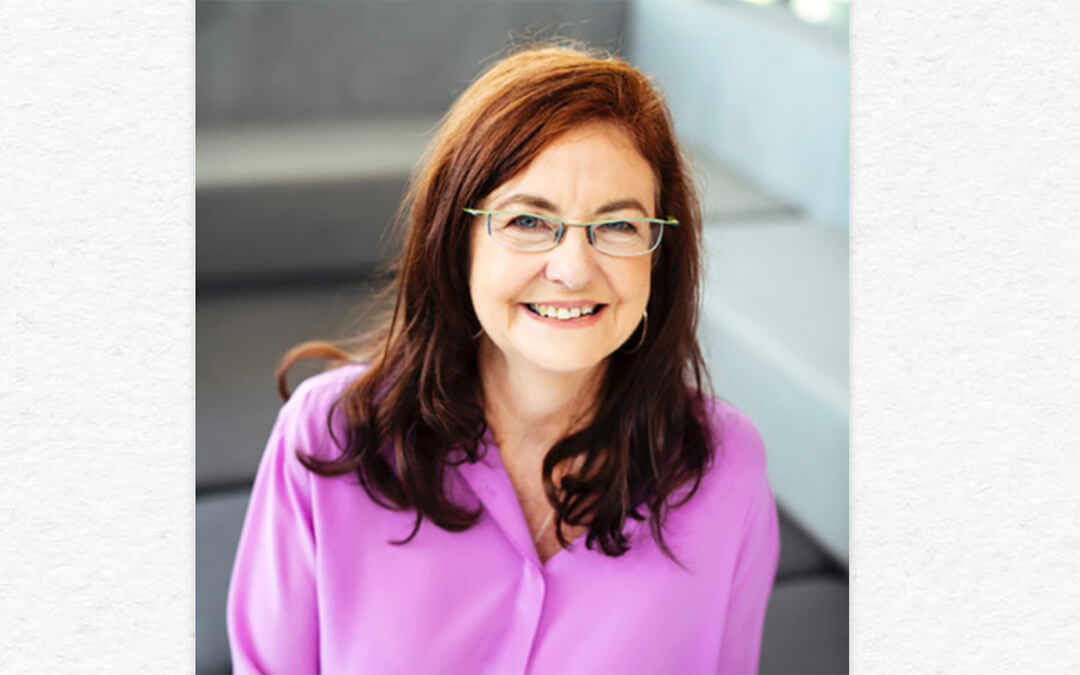Award-winning journalist, author and commentator, Madonna King, spoke of the remarkable relationship that John Wallis had with his mother and how through his letters he spoke of the every day things of his life. Dear Mother, Dear Father – Letters Home from John Corcoran Wallis 1927-1949 was officially launched by Madonna King in Banyo, Queensland, on 11 March 2020.
In launching the book, Madonna provided the following reflection:
If only my mother was alive to see me do this: launch Bernadette Wallis’ great book, Dear Mother Dear Father, tonight. It would have trumped interviews I’ve done with a US president, six Australian prime ministers and a host of others. That’s because Catholicism while dear to me, was my mother’s life, and in this process of asking me to launch this tonight, Bernadette has come across others who knew mum, not me, because of the importance of the values and ideals she upheld – and encouraged us – her five children – to do the same.
Dear Mother, Dear Father, of course, includes dozens and dozens of letters home from John Corcoran Wallis; Bernadette Wallis’ uncle, but as a young boy and then a young man. They are beautiful and poignant and take us back to another place and another time. Just before I come back to the book though, let me explain that John Corcoran Wallis entered the seminary at St Columba’s College in Springwood, just near the Blue Mountains at the age of 16. I have a 16-year-old; and wow, even that fact is something worth us pondering on.
Two years later, he went to the seminary at St Patrick’s College in Manly and in 1932, he was ordained a priest for the Archdiocese of Hobart. Twelve years later, he founded the Missionary Sisters of Service (MSS) a Catholic religious order and a fitting legacy for a life well lived and a religion that was his guiding force.
I started by mentioning my mother this evening, and what I found so fascinating – uplifting and heart warming and intriguing – was the relationship between John Wallis and his own mother. It shows how important she was to him. He chats, in letters, about his every day life in the same way we hope our children will always do. “We had a special dinner on Sunday in honour of St Columba,” he told his mother in 1927. “We had fowl and bacon and then jellies and drinks. We have a three course meal; we have mutton, vegetables and potatoes, practically the same as at a restaurant.” His optimism in that letter is infectious, “the same as at a restaurant.”
Bernadette makes the point in one piece of analysis that he values his mother’s intelligence and, John at just 16 and 17, expresses real concern for her at times too. “His youthful hopes are shared and he can discuss  anything with her,” Bernadette tells us. And at one point, John tells his mother to “try to get away for a holiday. Perhaps too in that time you might be able to go to some Convent for even one day and there have a while with Our Lord, away from everything else.”
anything with her,” Bernadette tells us. And at one point, John tells his mother to “try to get away for a holiday. Perhaps too in that time you might be able to go to some Convent for even one day and there have a while with Our Lord, away from everything else.”
He talks to her about his beliefs, and the weather, family matters and money woes, sport and the hard road towards ordination. His resolution, one September, he told his mother was to “study harder”. I found almost comforting his ability – at that age – to share his secrets and his goals and his vulnerabilities so openly with his mother – and it really is testament to their relationship.
And he talks to her about the mundane too; those every day things like his schedule. Rising at 10 to 6. Prayers at 6.30. Mass at 7. Breakfast at 8.15. “Before breakfast we sweep out our rooms and get our books ready for study. After breakfast we have about 20 minutes for a walk and then the first lecture of the day begins at 9.” We learn there’s more lectures and study up until 7.40pm. Tea is at 8 and then recreation for one hour. After prayers we go to bed at 9.15pm.” There is so much in that one letter I’d like to lock in for my teenagers…not least the absence of television!
His gratitude shines through. “Goodbye now dearest Mother and may God bless you for your goodness to me,” he says at another time. “I feel very sad at times when I think of all that I have been costing you but then I feel very happy to know you see all in the light of Faith and that I will be able to give you joy on the great day.” His ordination. And while others get carried away, he doesn’t. “All I want is a little quiet – perhaps you and I will manage a quiet walk on the evening of the grand day.” What a beautiful thing for a son to tell his mum.
His insight is on display many times, including in a letter to his mother six years after he left to study for the seminary. “I seem to have gone through a lot in that time and still I seem to be so much a boy in many things. It is a strange feeling that one is looked up to and trusted by all the old and young. They all come to ask advice and guidance and you know how poor a reed they are leaning on. Were it not that I feel there must be special graces with the priesthood, I should be afraid that God uses poor instruments to do His own good work…”
And he goes on to show marvellous insight again here. “One thing I do find the need of here is the assistance of another in my own worries. We are teaching people, guiding them and so on and yet we so often need guidance ourselves.” And this, at a later time: “I feel so weak and so much a boy still. It surprises me at times the people trust me.”
Dear Mother Dear Father also provides a delightful look at history and some of the debates that still remain relevant decades later. “We had Parliamentary Debate last night,” he tells his mother in letter 14. “…the question being Should Capital Punishment Be Abolished.
But Dear Mother Dear Father also highlights who John Corcoran Wallis was, and what drove him to create such a wonderful legacy for the Catholic Church. We grow up with him. We see, at 17, his language embrace a religious tone; he mentions the guardian angel, the feast days of the month, the high altar. Later we learn that of Assumption Day he says, “This is the day which I love…it is on this day that each one tries to offer Our Lady 1000 Hail Mary’s – 20 rosaries – 100 decades!”
We learn he has a wry sense of humour, and an ability sometimes to see things – in people and the environment – that others don’t. We learn that he loves books and the value of sacrifice. “I wish and pray that my life may be one big sacrifice made from the small and rival sacrifices of everyday life. Sacrifice for love is true happiness.” This is a young man, almost 100 years ago. And we see him mature – “The right intention was there and God sees the spirit rather than the actual deed.” He had this innate sense of what is right – a perspective – and I’m not sure how to explain it – but at one point he says, “Let us hope and pray that the priests of Australia will in the future have the interest of the people at heart.”
And at another time: “I often think we do not realise here what trials and difficulties people are having outside in the world.” That insight, and it’s constant, is a treasure. “I love these poor people,” he says in another letter. “They are Our Lord’s own and I only wish I could do more for them.” And this, in letter 55 to his mother: One of the chief dangers of a priest is that he fixes all his attention on the work, forgetting the motive for whom he works.”
Reading Dear Mother Dear Father you can’t help like John Corcoran Wallis. And sensing the type of person he was: thoughtful and considered, with a special gift of insight beyond his years. It’s hard to imagine a 16 year old and 17 year old writing some of these letters to their mother, and that itself is a piece of gold here. The language. Penning his vulnerabilities and hopes and dreams.
Oh and his focus on the weather. “I am writing this letter in the bush,’’ he says just after his 17th birthday. “It is beautiful. Not a cloud in the sky.’’
In a world of Twitter and Facebook, Tic Tock and Instagram, this commentary, penned in letters, is just beautiful on so many levels. But what struck me, as a mother of two teen girls finding their way through adolescence, was that bond he shared with his mother. We don’t see her letters, but we can almost feel her guiding hand, and her pride and the sacrifice she made as a mother, that her son would find the right path. Of course there are letters to others, including his father, but it was the relationship with his mother that stood out to me.
Bernadette says in the book’s introduction that she hopes, by publishing these letters as a book, it might be a resource – or pave the way for any future research that might be done in relation to John’s other writings. But  it does so, so much more than that. It takes us back, and gives us a window seat in history. It tells a wonderful tale of a young man on a physical and spiritual journey. It also illustrates the warm and unique relationship between mother and son. And provides the story behind the founding of the Missionary Sisters of Service. It’s a legacy, as well as a great read; and I want to congratulate Bernadette because I’ve written a few books and it’s harder than giving birth. Congratulations Bernadette.
it does so, so much more than that. It takes us back, and gives us a window seat in history. It tells a wonderful tale of a young man on a physical and spiritual journey. It also illustrates the warm and unique relationship between mother and son. And provides the story behind the founding of the Missionary Sisters of Service. It’s a legacy, as well as a great read; and I want to congratulate Bernadette because I’ve written a few books and it’s harder than giving birth. Congratulations Bernadette.
It is my pleasure tonight to launch Dear Mother, Dear Father. – Letters Home from John Corcoran Wallis 1927-1949.

